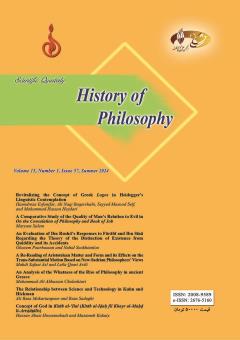An Evaluation of Ibn Rushd’s Responses to Fārābī and Ibn Sīnā Regarding the Theory of the Distinction of Existence from Quiddity and its Accidents
Subject Areas : Comparative studies in the field of history of philosophy
Ghasem Pourhasan
1
![]() ,
Nahid Sookhtanloo
2
,
Nahid Sookhtanloo
2
![]()
1 - Associate Professor, Philosophy Department, Allameh Tabataba’i University, Tehran, Iran
2 - MA in Islamic Philosophy and Kalam, Allameh Tabataba’i University, Tehran, Iran
Keywords: Quiddity, occurrence, Existence, Ibn Rushd, Fārābī, Ibn Sīnā,
Abstract :
The discussion of existence and quiddity and the relationship between them is one of the fundamental debates in philosophy, and various portraits of this relationship can be shown in distinct natural, logical, and philosophical molds. The word “distinct” is a homonym in these cases and has a particular meaning in each one. However, these meanings have been frequently confused with each other in the history of philosophy. One of the innovations of Islamic philosophy is the theory of the distinction of existence from quiddity, which was only possible in the light of understanding the meaning of the truth of existence. Islamic philosophers, particularly Fārābī and Ibn Sīnā, tried to perceive existence differently from Aristotle and not to reduce the question of being to the whatness of objects because of their epistemological distance from the Greek tradition in philosophy. Nevertheless, this approach has also had its own critics. One of the philosophers who criticized the distinction of quiddity from existence is Ibn Rushd. He accused Ibn Sīnā of misunderstanding and heresy regarding the relationship between existence, quiddity, and accidents of existence and believed that Ibn Sīnā had confused the different meanings of existence and the one and had fallen in the trap of sophistry due to homonymy. Ibn Rushd maintained that the origin of the formation of objects is substance and considered existence to be merely a concept that can be abstracted from existing objects. His main criticism of Ibn Sīnā concerning this problem was that viewing existence as an accident for quiddity leads to several misconceptions such as equating existence with substance. However, Ibn Rushd himself had in fact failed to understand the meaning of existence as an accident in Ibn Sīnā’s view. He believed that Ibn Sīnā had equated existence and accident in the sense of a quiddative affair with each other, while Ibn Sīnā’s intention of occurrence of existence to quiddity as an accident was its addition to quiddity.
ابنرشد، ابوولید محمد (۱۳۷۷) تفسیر مابعدالطبیعه، تحقیق موریس بویژ، تهران.
ابنرشد، ابوولید محمد (۱۳۸۲) تهافت التهافت، تحقیق سلیمان دنیا، تهران: شمس تبریزی.
ابنرشد، ابوولید محمد (۱۹۹۳م) تهافت التهافت، مقدمه و تعلیق محمد العربی، بیروت: دارالفکر.
ابنسینا (۱۳۷۵) الاشارات و التنبیهات، شرح خواجه نصیرالدین طوسی، قم: بلاغت.
ارسطو (1378) ارگانون، ترجمۀ میرشمسالدین ادیب سلطانی، تهران: نگاه.
ارسطو (1400) متافیزیک، ترجمه شرفالدین خراسانی، تهران: حکمت
پورحسن، قاسم (1393) «فارابی و نظریۀ تمایز وجود از ماهیت»، فصلنامه تاریخ فلسفه، شمارۀ 19، ص90ـ63.
دیباجی، سیدمحمدعلی (۱۳۹۶) «تمایز فلسفه ابنسینا و ارسطو بروایت کتاب تهافت ابنرشد»، حکمت سینوی (مشکوه النور)، شمارۀ 57، ص26ـ5.
عارفی، سیمین (۱۳۹۲) «شکلگیری نظریۀ فلسفی تمایز وجود و ماهیت در جهان اسلام؛ بررسی دیدگاه کندی و فارابی»، پژوهشهای فلسفیـکلامی، شمارۀ 58، ص35ـ23.
عبودیت، عبدالرسول (۱۳۸۵) درآمدی به نظام حکمت صدرایی، ج1، تهران: سمت.
فارابی، ابونصر محمد (1381) فصوص الحکم، .
نصر، حسین؛ لیمن، الیور (۱۳۸۶) تاریخ فلسفه اسلامی، ج۲، تهران: حکمت.
نوبخت، بیژن (۱۳۸۴) «وحدت و کثرت وجود در فلسفه ابنسینا»، اندیشه دینی، شمارۀ ۱۴، ص112ـ99.


